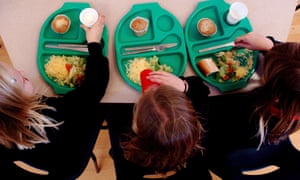
Pic:Theresa May has opted to end free school meals for infants
Staff reporter(wp):
About 900,000 children from struggling families will lose their right to free school lunches under a cut unveiled in the Conservative manifesto.
The total includes more than 600,000 young children recently defined as coming from “ordinary working families”, according to analysis for the Observer by the Education Policy Institute.
It means that the surprise measure risks undermining Theresa May’s pledge to prioritise families that are “just about managing” – those who are in work, but struggling to make ends meet.
May opted to end universal free school lunches for infants, introduced under the coalition government, and replace them with free breakfasts. The money saved will be used to see off a looming Tory rebellion over school funding.
The move risks punishing exactly the kind of families the prime minister has promised to help and will cost families about £440 for every child hit by the cut. It is likely to save about £650m a year. However, the Conservatives pointed to recent evidence that free breakfasts were more cost-effective, adding that the poorest children would still receive a free lunch.
After a week in which the parties released their election manifestos, more Tory candidates expressed private reservations about their party’s plan to make people pay for their old-age home care through their estates.
With the large Tory poll lead closing slightly in recent days, some nervous candidates are urging the leadership to make another attempt to explain the policy to voters, while others are planning to lobby for concessions after the election. May has insisted it is a fair measure that ensures only those with estates worth more than £100,000 will pay.
Jeremy Corbyn attempted to exploit the row by accusing the Tories of provoking a “war between generations”. He accused May of drawing up an “anti-pensioner package” that weakened protections for the state pension, removed the winter fuel allowance from many and forced thousands to pay huge amounts for home care. Tim Farron, the Lib Dem leader, said May’s social care policy would “go down as her poll tax”.
The decision to axe universal free school lunches for infants comes only three years after they were introduced by Nick Clegg, the former deputy PM.
The Education Policy Institute’s analysis found that about 100,000 children who are in relative poverty will no longer receive a free meal under May’s proposals. It found that an additional 667,000 children defined as coming from “ordinary working families” would no longer receive a free lunch.
Overall, its research concludes that about 900,000 children who are either eligible for the pupil premium supplement or classed as being in ordinary working families will lose the right to a free hot lunch.
A Conservative source questioned the figures, claiming they had been “cobbled together” by an organisation led by a former Lib Dem minister, David Laws. A Tory spokesman said: “We don’t think it is right to spend precious resources on subsidising school meals for better-off parents. So instead we will give that money to headteachers, to spend on pupils’ education instead.
“We will make sure all those who need it most still get free lunches – and will offer a free school breakfast to every child in every year of primary school. So the most disadvantaged children will now get two free school meals a day rather than one.”
Labour has pledged to extend the free school lunches policy to all primary school children. It plans to pay for the £1bn-a-year measure by applying VAT to the fees paid for private education.
Russell Hobby, general secretary of the school leaders’ union NAHT, said: “It is always disappointing when a policy is abandoned after only being given a few years to bed in. This sort of chopping and changing actually costs more money in the long run.”
However, there has also been support for free breakfasts. The respected Institute for Fiscal Studies has concluded that free breakfasts improved the performance of young children and were likely to be “more cost-effective”.
Geoff Barton, general secretary of Association of School and College Leaders, said evidence supported a school lunch system in which “children on free school meals have them discreetly paid for while children whose parents can pay should do so”.
The government has defined ordinary working families as those that are not eligible for the pupil premium, but still have below-average incomes. The pupil premium is aimed at a poorer group. It includes any child who has been eligible for free school meals at any point in the past six years because of their family’s low income.
Natalie Perera, executive director of the Education Policy Institute, said: “Around 900,000 children from low-income families will lose their eligibility for free school meals under these proposals. Around two-thirds of those children are from what the government considers to be ‘ordinary working families’.
“The typical annual cost for an ordinary working family would increase under these proposals to around £440 for each child aged between four and seven.”
No comments:
Post a Comment